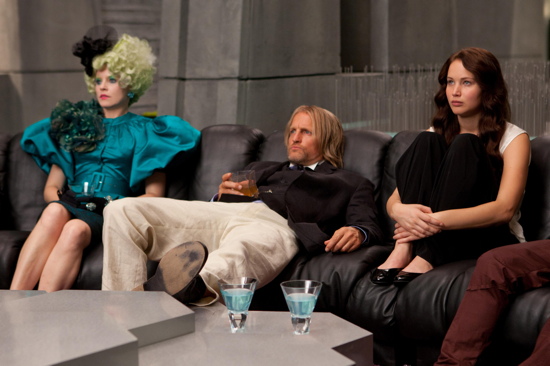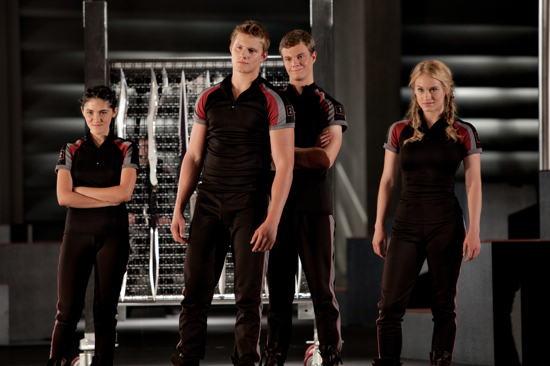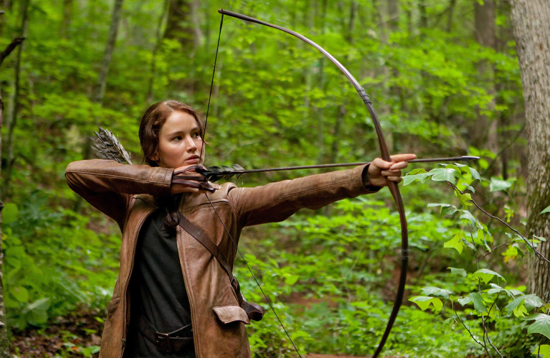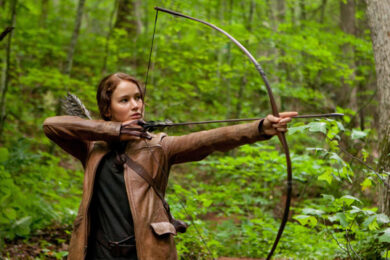So it’s a future America some decades hence. Some kind of war broke out 75 years before the start of the action. This is never quite explained but climate change and fighting over resources are implicated. Since then the country’s been patched together as Panem, a decadent Capitol surrounded by twelve productive districts, each of which specialises in one field: fishing, electrical goods, textiles, etc., that are sent to the Capitol, which sends its police force of ‘peacekeepers’ out to keep the goods flowing in and the provincials in line. Some districts make luxury goods and their citizens have a passable standard of living. In others, the people starve, and are kept alive with stingy rations.
As a price for their peacekeeping and rations, the Capitol demands that each district sends a male and female ‘tribute’ between the ages of 12 and 18 and chosen by lottery in a ‘reaping’ from each district, each year, to fight to the death in a televised splatterfest until one victor remains, who returns to his or her district to live in luxury for the rest of their life. Of course. Because it’s Panem as in panem et circenses, bread and circuses, and the gladiatorial shenanigans and imperial Roman depravity that implies. The story follows 16-year-old Katniss Everdeen, from coal-mining District 12, who ‘volunteers’ for the Games in place of her younger sister. She’s a hunter, and a badass, and might even be able to survive in the arena, even against the ‘career’ tributes from wealthier districts who have trained for years.
Dystopian fiction offers catharsis. It presents alternate worlds where elements of a real-world situation are amplified to their most disturbing extremes, and then played out to the point that the dystopia collapses (audiences can feel relieved: the worst won’t happen in their own reality if even the worst-case scenario falls apart) or the dystopia grows to crush all hope (audiences can feel relieved: at least the worst of the dystopia hasn’t happened yet). Besides focusing on surveillance, militarism and reality TV, The Hunger Games‘ set-up is nicely applicable to this late capitalist moment because it introduces a hell of a lot of ambiguity about complicity and participation in a rigged system, and which way this dystopia will play out is in no way a given.
Everyone in the Districts hates the Games; everyone watches. In an early scene, Katniss’ friend Gale asks her what would happen if everyone stopped watching. In a resigned tone, Katniss says, "That would never happen." Everyone is part of the system they hate and did not choose, and is partly responsible for its perpetuation, voluntarily or not. For audiences of The Hunger Games, the critique also stands, because the feeling of getting sucked into the narrative action is complicity with the gamemakers. (Think of all of the ‘behind the scenes’ shows that complement any televised talent contest – the big reveal never reveals much, and only encourages people to watch more.) Whether we’re observing the horror of kids killing each other through Katniss’ eyes or not, at some level we are being entertained even as we are repulsed. Add to this the merchandising machine: there is a rumoured Katniss Barbie in the works, and China Glaze have produced a line of nail varnishes ‘inspired’ by Hunger Games characters. It’s no wonder that posts on Jezebel and other ladyblogs are full of fans writing comments like ‘I love these nail polishes… OMG we are the Capitol, it’s gross.’
As for the role of Katniss, every actress from the tier of precocious teens seen on the covers of adult fashion mags (the Hailee Steinfelds and Chloe Moretzes) to Disney tweenlets desperate to not have to stripperise the second they’re legal campaigned hard for this part. Jennifer Lawrence works because of how often she plays it with pragmatism and intelligence: she’s cagey and deadpan.
The rest of the casting is equally brilliant, even if most of the adult leads appear to be having a ball camping it up with their referencing. Woody Harrelson plays Haymitch Abernathy, the drunken mentor to the District 12 tributes, as a louche Mark Twain by way of Iggy Pop. Blue-haired Stanley Tucci, as the Games’ host Caesar Flickerman, might as well be late career Peter Sellers. Elizabeth Banks, as Katniss’ chaperone Effie Trinket, looks like a syphilitic reject from a Fassbinder cabaret sequence, with her towering pink wigs and kabuki makeup. Only Lenny Kravitz, as Katniss’ stylist and friend Cinna, is calm, simply styled, and plays his role with grace; he’s not given enough to do here.

The sets have a creaking retro look: Katniss’ District 12 resembles Coal Miner’s Daughter, a bit of literalism too far (and jarring against the massive TV screens in the town square). The train from District 12 to the Capitol is like an Etsy-steampunked business lounge, and even the luxury hotel the tributes stay in as they train for the games is full of lurid and unnecessarily pointy plastic chairs that look sticky and hollow to the touch. The Capitol’s aesthetic is halfway between the Berlin Love Parade and a technoid Ikea bargain bin, full of brushed grey plastic pretending to be metal. There’s a retina-singeing amount of fuchsia and chartreuse and burnt lime.
Much has been said about the edits needed to grant this film a PG-13 rating in the States – here it’s 12A – so that the millions of teenagers and tweens who devoured the series can actually get through the cinema doors. There are concessions: while the books describe some of the death scenes in gory detail, the film is edited to not show the bloodiest kills. Most happen off-camera, or in seconds, and no one’s face is falling off or anything. The camera does not linger over dead bodies or show them being lifted away. In the books drone airships sweep them up after the cannon announcing each tribute’s death sounds, presumably to keep audiences at home focused on the action, and not really thinking about what’s happening to the corpses. The books also toss out a few throwaway references to cannibalism (the tributes are starving, after all) and the past competitors who ate chunks of their rivals before the gamemakers intervened to put them down. No film targeting a teen audience in the States is going to go there – once a character’s death is established, that’s it. (Also: despite the set-up of the Games, Katniss never kills in cold blood, only when directly threatened.)
And unlike Battle Royale, or Series 7: The Contenders, there is no hint of eroticism, no quick-let’s-do-it-before-we-die. Even though you’ve got a group of teenagers who might be horny or curious in other circumstances, and a ‘losing it’ subplot is standard for lots of horror films with lower body counts, one thing The Hunger Games is not is sexual, despite the countless shipping containers across the globe stuffed with servers full of the raunchiest Hunger Games-themed slash you can imagine. Some of that is due to the YA veil of coyness that gets drawn over this stuff – even Twilight: Breaking Hymen was full of ripping flesh and biting fetuses out of wombs, but the actual sex was more suggestive than explicit (which just gave fanfic writers more room to improvise). Most of the Hunger Games‘ tributes (the bloodthirsty careers excepted) wander through the killing fields of the game looking dazed and bewildered. There’s a love story that reads as half real, half playing to the cameras and the television audiences, and some scenes of real tenderness – but mostly, the action is quick and grim.

There’s so much political stuff that doesn’t make it into the film, like explanations of the electrified fences bounding each of the districts and the punishments for those who try to escape, or the way that the reaping slants in favour of the better-off. Each family with a teenager of reaping age can get extra food rations for entering their name multiple times in the lottery, something that’s not explained here. A better writer than I am could have set up some kind of play on that and this week’s budget and made it amusing. What is mentioned about the relationship between the Games and the government of Panem is not subtle, but nicely played. Gamemaker Seneca Crane (Wes Bentley, the plastic bag-filming lawn burner from American Beauty, but with an extra bit of ridiculous beard that looks like Aubrey Beardsley stenciled it on his face) and President Snow (Donald Sutherland in coal-eyed Santa mode) argue as the games go on about how people need to be motivated by some hope, but not given enough to think that things will change. Crane argues that underdogs inspire people at home; Snow is disgusted that underdogs exist at all.
Crane’s no idealist, though: he’s a technocrat and showman, out to produce the most technologically advanced, emotionally manipulative spectacle possible. It’s telling that the only group of people in the film who aren’t dressed like they stepped off the set of The Fifth Element or out of some Dorothea Lange photos are the gamemakers in their war room. In their plain white jumpsuits, sitting around their banks of tabletop touch screens, cheering at successful deployment of firebombs, they could be swapped out for any footage of mission control at NASA. In Zuckerberg-aspie style, the gamemakers’ work is not about morality or aesthetics or anything but getting their jobs done with elegant efficiency. Human consequences are irrelevant. Today, if he were real, Crane would probably be giving a TED talk about it.
He’s a bit like the judge in the 15 Million Merits episode of Black Mirror who sees a marketing opportunity in a reality show contestant who threatens to stab himself on live TV in protest, or, going further back, Faye Dunaway’s TV exec character in Network who hires a cast of radicals for her ‘Mao Tse-Tung hour’, and kills one off when ratings fall. How much rebellion can a system incorporate, and sublimate? Is there a point of overload? At the end of the film, Snow and Crane are both right about this balance, and both wrong. We only hear from them because no one who leaves the arena is given a chance to catch their breath and think about it – that’s left for the next film and, with this cast, should be interesting to explore. Nothing’s really resolved, but it’s a good kind of uncomfortable.



